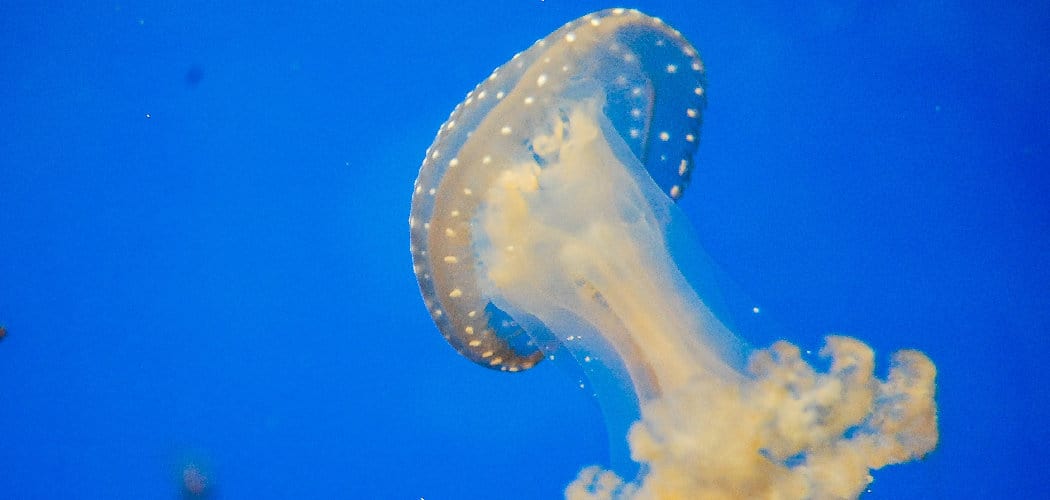Jellyfish evoke feelings of awe and mystery. These creatures of the sea have a spiritual meaning that is often overlooked. Although they may seem simple and delicate, jellyfish are complex and powerful beings. In this blog post, we’ll explore jellyfish spiritual meaning and how they can help us connect with our own power and intuition.

Jellyfish are often seen as symbols of transformation. This is because they can change their shape and form. Jellyfish are also known for their ability to travel long distances. They go with the flow and let the currents take them where they need to go. In this way, jellyfish can teach us about surrendering to the flow of life and trusting that we will end up exactly where we need to be.
Jellyfish Symbolism and Meaning
Jellyfish Native American Symbolism
In many cultures, jellyfish are seen as symbols of transformation. Their ability to spend long periods in both the air and water represents the journey between life and death. In some Native American cultures, jellyfish are also associated with healing. It is said that their venom can be used to treat a wide range of illnesses, from headaches to heart disease.
In addition, their unusual appearance is thought to represent the duality of nature. The fact that they have no brain or central nervous system is seen as a symbol of spiritual enlightenment. To the Native Americans, jellyfish are creatures of great power and wisdom.
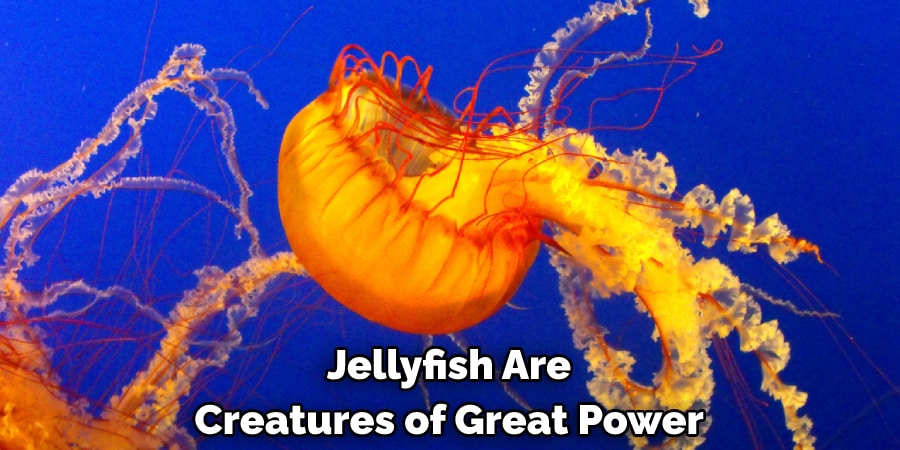
Jellyfish Eastern Symbolism
Jellyfish have been a source of fascination for humans for centuries. These strange and beautiful creatures have been integral to the mythology and folklore of many cultures, most notably in Asia. In Japan, jellyfish are seen as a symbol of grace and beauty, while in China, they are associated with transformation and rebirth.
In Korea, jellyfish are believed to possess the power to ward off evil spirits and are often used in traditional medicine. While the symbolism of jellyfish may vary from culture to culture, one thing is clear: these creatures profoundly impact the human imagination.
Jellyfish Christianity Symbolism
The earliest references to jellyfish date back to Aristotle in 350 BCE. In his work “History of Animals,” he described them as “immortal” creatures that were born from the sea. This perception of jellyfish as immortal beings has persisted throughout history, and they have been used as symbols of immortality in many cultures.
In Christianity, for example, jellyfish are often used to symbolize Christ’s resurrection. The fact that jellyfish can regenerate themselves after being injured also makes them ideal symbols of hope and resurrection. Consequently, jellyfish have a long history of being used as symbols of Christianity.
Jellyfish Celtic Symbolism
For many centuries, jellyfish have been a source of fascination for people worldwide. They are beautiful creatures with a unique life cycle that has made them a symbol of transformation and rebirth. In Celtic mythology, jellyfish are often associated with the goddess Morgan le Fay.
Morgan is known for her ability to transform herself into different animals, and the jellyfish is said to be one of her favorite forms. Like Morgan, jellyfish are seen as symbols of change and new beginnings. When someone sees a jellyfish, it is said to be a sign that they should let go of their past and embrace the new chapter that awaits them.
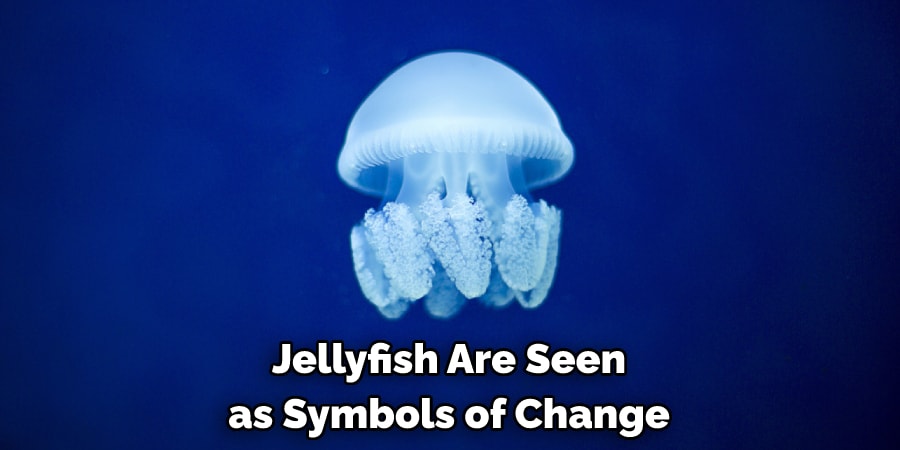
Jellyfish African Symbolism
Jellyfish have long been a part of African folklore and symbolism. In many cultures, they are seen as guardian spirits or lucky charms. Jellyfish are also thought to be able to ward off evil spirits. In some traditions, it is believed that jellyfish can help people to find their way in life. Therefore, they are often given as gifts to young children starting out on their journey through life. Jellyfish are also popular symbols in African art.
They are often used to decorate paintings, sculptures, and other works of art. Jellyfish symbolism is also present in African music. Many songs and stories use jellyfish imagery to convey messages of guidance and protection. From ancient times to today, jellyfish remains an important part of African culture and symbolism.
Jellyfish Spiritual Meaning
Jellyfish have been around for over 500 million years, making them some of the oldest creatures on Earth. In many cultures, jellyfish are powerful symbols of transformation and rebirth. For example, the ancient Greeks believed that jellyfish were the souls of deceased sailors, and the Japanese still consider them to be good luck charms. In Chinese legend, a jellyfish transformed into a beautiful woman who married a dragon prince.
The Kraken, a giant sea monster said to dwell off the coast of Norway, is also sometimes described as a giant jellyfish. Given their long history and mystical associations, it’s no wonder that jellyfish have become popular symbols in both Eastern and Western spiritual traditions. To many people, they represent the endless cycle of life, death, and regeneration. Yet, jellyfish can also be seen as reminders that we are all connected to one another and to the natural world.
Whether we view them as mystical creatures or simple organisms, jellyfish continue to amaze and inspire us. Keep reading for more information about jellyfish spiritual meaning.
Jellyfish in Dreams
Dreams are often bizarre and nonsensical, but they can also be deeply meaningful. For example, many people report dreaming about jellyfish. What could this possibly mean? There are a few possible interpretations. One is that the jellyfish represents some kind of emotional “sting.” Perhaps the dreamer is feeling hurt or betrayed by someone close to them. Alternatively, the jellyfish could represent something poisonous or dangerous.
This might warn the dreamer’s subconscious to stay away from certain people or situations. Finally, the jellyfish might simply symbolize the unknown or the unfamiliar. Dreams often give us a glimpse into our unconscious mind, and a jellyfish might represent something we are not yet aware of. Whether it is a positive or negative symbol, only the dreamer can know for sure.
Jellyfish’s Meaning in Mythology and Folklore
Folklore and mythology often give jellyfish a bad rap. In some stories, they’re stingy, slippery creatures that entangle hapless sailors in their long tentacles. In others, vengeful spirits haunt the seas, luring unwary swimmers to their doom. However, there’s more to jellyfish than meets the eye. In many cultures, jellyfish are also seen as symbols of transformation and rebirth.
In China, for instance, the creature is associated with the legend of a dragon-turned-immortal who had to shed his skin to achieve immortality. As a result, the jellyfish has become a popular symbol of good luck and rebirth. In Japan, meanwhile, the ethereal creature is often associated with the afterlife and is often used in funeral rituals. Whether you see them as friend or foe, there’s no denying that jellyfish have long been a source of fascination – and terror – for humans.
Jellyfish Totem Animal
The jellyfish is a fascinating creature of the sea. Often feared because of their stinging tentacles, jellyfish are actually gentle giants that are among the oldest living animals on Earth. Jellyfish have lived in the ocean for over 500 million years, and their simple, elegant morphology has remained relatively unchanged. As totem animals, jellyfish can teach us about the power of change and adaptability.
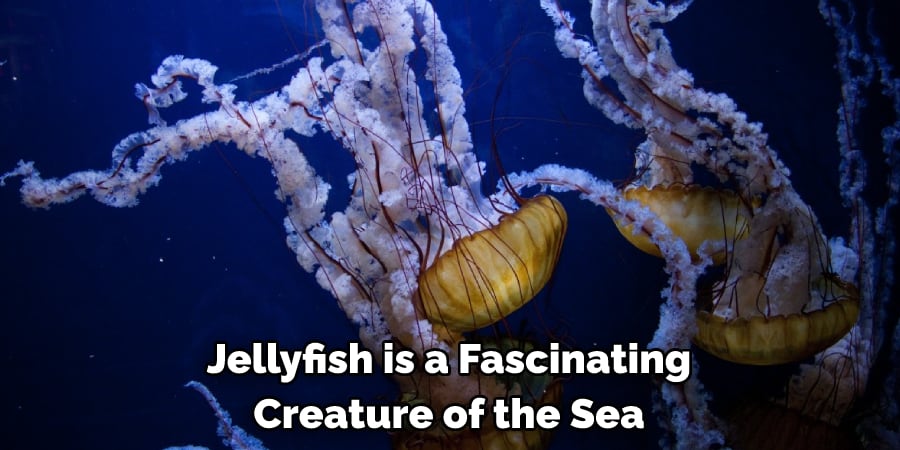
Like the jellyfish, we must be able to flow with the tides of life and adapt to our changing environment. However, we must also be aware of the danger of stingers, both literal and figurative. So the next time you see a jellyfish floating gracefully through the water, take a moment to reflect on the lessons it has to offer.
Jellyfish are often seen as a symbol of transformation and rebirth. Their ability to regenerate lost body parts makes them a powerful totem for those seeking to make positive changes in their lives. Jellyfish can also teach us the power of non-attachment and living in the present moment.
Jellyfish Tattoo Meaning
Jellyfish have been around for over 500 million years, and their simple yet striking appearance has made them a popular choice for tattoos. While the precise meaning of a jellyfish tattoo can vary depending on the individual, several symbolism associated with these creatures makes them particularly popular tattoo designs. First, jellyfish are often seen as a symbol of rebirth and regeneration due to their ability to regenerate their tentacles.
They can also be seen as a symbol of strength because they can survive in some of the most hostile environments on Earth. In addition, jellyfish are also often seen as a symbol of change and adaptability, as they can quickly adapt to changes in their environment. Ultimately, jellyfish tattoos can be seen as a reminder that no matter what life throws your way, you will always have the strength to overcome it.
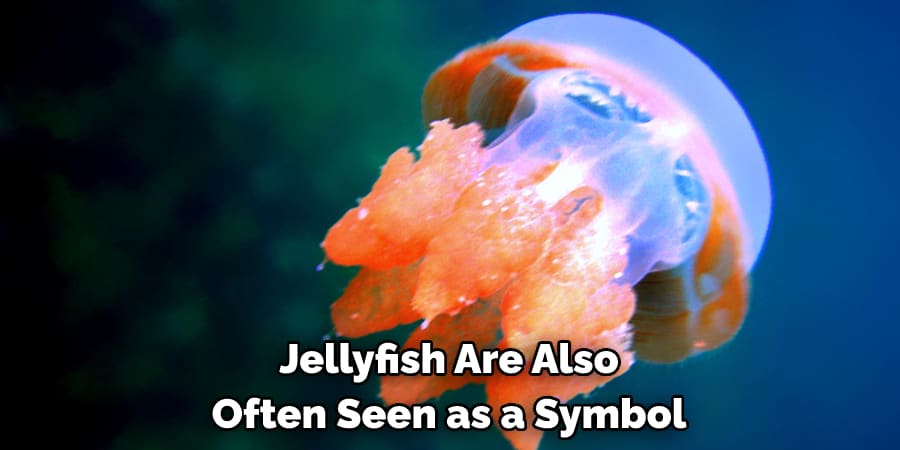
Conclusion
The spiritual meaning of jellyfish is transformation. They are messengers of change and can help us let go of the past to move forward in our lives. If you are feeling stuck or like you’re not moving forward, consider working with a jellyfish spirit guide to help you get unstuck and start making progress. Thanks for reading our post about jellyfish spiritual meaning.
You Can Check It Out Crab Spiritual Meaning, Symbolism, and Totem

